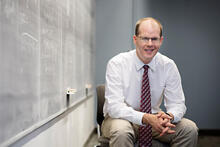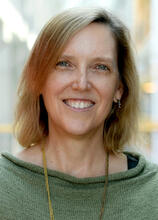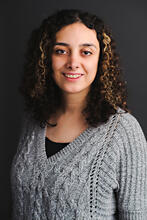When it comes to fostering an inclusive and supportive community on campus, three groups stand out for their commitment not only to women (and those whose gender is neither male or female), but to individuals with diverse backgrounds, abilities and interests. As of Fall 2019, women represented 36.5% of the undergraduate population in the Faculty of Mathematics and 24.4% in the School of Computer Science. At the graduate level, these numbers sit at 32% and 18.9% respectively. These percentages have been increasingly over the past decade, thanks in large part to the work of WWIN’s partner groups: The Centre for Education in Mathematics and Computing (CEMC), Women in Computer Science (WiCS), and Women in Mathematics (WiM).
We asked each partner to share a little more about their programs, and passion for diversity.
Ian VanderBurgh, Director, Centre for Education in Mathematics and Computing (CEMC)
 Tell us a little about your background and what brought you to Waterloo.
Tell us a little about your background and what brought you to Waterloo.
I was a student who was brought to Waterloo by our outreach. Waterloo’s math contests helped me see mathematics in interesting ways outside of the curriculum, and also introduced me to Waterloo Math. Workshops for students at that time brought me to campus and helped feel comfortable here, and so coming to Waterloo as a student and eventually as a faculty member were natural fits.
How does the CEMC support diversity in the Faculty?
The CEMC is the Faculty’s outreach arm. Our mission is to increase interest, enjoyment, confidence, and ability in mathematics and computer science among learners and educators in Canada and internationally. As part of this, for almost 20 years, the CEMC has had programming specifically aimed at groups of young people who are underrepresented in mathematics. Two of our key initiatives in this area are Think About Math! and Seeking Possibilities and Rewards in Computer Science (SPARCS) which exist to encourage young women, and people of other under-represented genders, to explore possible interest in mathematics and computer science. The CEMC is also currently exploring how to best contribute to Indigenization in mathematics education as well as working on some new projects in Africa to support mathematics education more globally.
What activities or supports do you offer potential future students through outreach?
The CEMC’s activities include mathematics and computing contests (typically, more than 260 000 students register for these each year), school visits (typically, we visit 300 schools each year speaking to 20 000 students), face-to-face workshops and conferences for students and teachers (typically, these involve 500 students and 200 teachers each year), online courseware and other free online resources (in 2019/2020, our courseware had more than 10 million page views; our Problem of the Week typically reaches more than 1 million students each week), and an online Master’s degree aimed at practicing secondary school teachers (there are currently more than 300 teachers enrolled with 430 graduates).
What makes you most excited about the WWIN network? Why do you think it’s important?
As in all areas, diversity in mathematics and computer science is crucial to the health, strength and success of these disciplines. All young people should know that there is a place for them in these fields.
Did anything change with the CEMC through COVID-19?
The CEMC is an amazing team of people that genuinely cares about education and others. When the pandemic hit in Spring 2020, our team immediately said “What can we do to help young people continue to learn?”. This led to the launch of CEMC at Home, a resource that was created daily for 13 weeks in the Spring at four levels (Grades 4/5/6, 7/8, 9/10, 11/12). These resources were downloaded more than 300 000 times in the Spring, and so clearly resonated with teachers, students and parents. The CEMC is committed to supporting education through these difficult times.
Jo Atlee, Director of Women in Computer Science (WiCS)
 Tell us a little about your background and what brought you to Waterloo.
Tell us a little about your background and what brought you to Waterloo.
After I finished my PhD, I applied to universities throughout North America. I was particularly attracted to Waterloo because of the quality of the students here (which is the most important criterion that faculty use in choosing which university they want to work at). I was also attracted to Waterloo because of its attention to undergraduate teaching (which is important to me) and because I was going to be the fifth female faculty member in Computer Science (CS) whereas everywhere else I interviewed, I would have been the first or second female faculty member in CS.
Since coming to Waterloo, I have grown to really appreciate the role that co-op education plays in helping students to become proficient in computing (giving students much more practice than we instructors could ever provide through course-based programming assignments!). For all of these reasons, wild horses could not drag me away from Waterloo!
How does WiCS support diversity in the Faculty?
WiCS is dedicated to promoting gender equity for those who are interested in studying computer science and who seek to pursue careers in computing. Specifically, we aim to foster community, empowerment and mentorship through all of our activities. We aim to build an environment in the School of Computer Science where women are supported in their work and studies, ensure young women entering university see computer science as an option and offer unique and supportive events for students on campus. In addition, WiCS has a very active undergraduate committee (warmly called "Little WiCS") that is student-run.
What activities or supports do you offer students and potential future students?
We work with corporate partners, and external organizations to offer events including technical interview prep, soft skills workshops, career panels, conferences and more. Each year, we also aim to send as many students as we can to Grace Hopper Celebration, the world’s largest gathering of women technologists, and CAN-CWIC, the premiere tech conference for Canadian Women in Computing.
Throughout the year, WiCS’s Undergraduate Committee hosts speakers, runs mentorship programs, offers office hours, and organizes social events to foster a sense of community.
WiCS is also committed to early outreach, offering programs for girls ages 10 to 18 in Waterloo Region to encourage them to explore technology and computer science. Our two main programs are GIRLsmarts4tech and Technovation Girls.
What makes you most excited about the WWIN network? Why do you think it’s important?
We at WiCS are incredibly excited about the initiation of the WWIN network. We have historically not had a strong relationship with alumnae of our Computer Science programs and would like to fix this. Our alumnae could play a critical role in building a stronger and broader community of Waterloo women in computing, as well as assisting us in delivering mentoring programs to our students. We also believe that WWIN will provide a means by which alumnae can build and enhance their own networks of professional technical women, which would improve their professional contacts and opportunities.
Ghazal Geshnizjani, Chair, Women in Mathematics (WiM)
 Tell us a little about your background and what brought you to Waterloo.
Tell us a little about your background and what brought you to Waterloo.
I grew up in the historic city of Esfahan, Iran. As a child, I was a very introverted student but when I was 11 years old, which coincided with the end of the Iran-Iraq war, a special school program for gifted students opened a branch in our city. To the surprise of my teachers and peers, I was accepted into this enrichment program. Very soon I realized my strength was in solving math problems and analytical thinking. That gave me the initial boost and motivation to pursue math.
Over the years, my interest gradually turned to mathematical physics, where I found it to be the place where analytical thinking and nature meet each other. I obtained my BSc degree at Sharif University, Tehran, Iran and then moved to the United States for graduate studies. I received my PhD from Brown University in 2005, followed by postdoctoral positions at University of Wisconsin-Madison, Perimeter Institute and University at Buffalo. I have been a faculty member at the Department of Applied Mathematics, University of Waterloo since 2012 and Chair of the Women in Mathematics committee since 2018. My area of research is theoretical cosmology and more specifically early universe cosmology. I also have two little sons and my husband is an astrophysicist.
How does your WiM support diversity in the Faculty?
This committee exists to support women and under-represented gender identities in mathematics. Our goal is that together we promote a culture that is friendly for all the students and the members of the faculty.
What activities or supports do you offer students?
Throughout the year, we organize different events and make opportunities for our members to come together, hear and learn from each other as well as some established female role models in academia, industry or other math and tech careers. Our events range from research talks, Lean in circle nights, speed networking, educational workshops and many more.
What makes you most excited about the WWIN network? Why do you think it’s important?
I believe the road towards addressing lack of diversity and inclusion in STEM fields is through building stronger communities among underrepresented groups. I am very excited and looking forward to working together with WWIN in order to strengthen our women networks within the Faculty of Mathematics and with our allies and supporters in Canada and across the globe.





